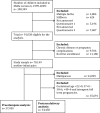Timing of probiotic milk consumption during pregnancy and effects on the incidence of preeclampsia and preterm delivery: a prospective observational cohort study in Norway
- PMID: 29362253
- PMCID: PMC5780685
- DOI: 10.1136/bmjopen-2017-018021
Timing of probiotic milk consumption during pregnancy and effects on the incidence of preeclampsia and preterm delivery: a prospective observational cohort study in Norway
Abstract
Objectives: To investigate whether the timing of probiotic milk intake before, during early or late pregnancy influences associations with preeclampsia and preterm delivery.
Design: Population based prospective cohort study.
Setting: Norway, between 1999 and 2008.
Participants: 70 149 singleton pregnancies resulting in live-born babies from the Norwegian Mother and Child Cohort Study (no chronic disease, answered questionnaires, no placenta previa/cerclage/serious malformation of fetus, first enrolment pregnancy). Only nulliparous women (n=37 050) were included in the preeclampsia analysis. Both iatrogenic and spontaneous preterm delivery (between gestational weeks 22+0 and 36+6) with spontaneous term controls (between gestational weeks 39+0 and 40+6) were included in the preterm delivery analysis resulting in 34 458 cases.
Main outcome measures: Adjusted OR for preeclampsia and preterm delivery according to consumption of probiotic milk at three different time periods (before pregnancy, during early and late pregnancy).
Results: Probiotic milk intake in late pregnancy (but not before or in early pregnancy) was significantly associated with lower preeclampsia risk (adjusted OR: 0.80 (95% CI 0.68 to 0.94) p-value: 0.007). Probiotic intake during early (but not before or during late pregnancy) was significantly associated with lower risk of preterm delivery (adjusted OR: 0.79 (0.64 to 0.97) p-value: 0.03).
Conclusions: In this observational study, we found an association between timing of probiotic milk consumption during pregnancy and the incidence of the adverse pregnancy outcomes preeclampsia and preterm delivery. If future randomised controlled trials could establish a causal association between probiotics consumption and reduced risk of preeclampsia and preterm delivery, recommending probiotics would be a promising public health measure to reduce these adverse pregnancy outcomes.
Keywords: MoBa.; Preeclampsia; The Norwegian Mother and Child Cohort Study; preterm delivery; timing of probiotic intake.
© Article author(s) (or their employer(s) unless otherwise stated in the text of the article) 2018. All rights reserved. No commercial use is permitted unless otherwise expressly granted.
Conflict of interest statement
Competing interests: None declared.
Figures
Similar articles
-
Associations of adherence to the New Nordic Diet with risk of preeclampsia and preterm delivery in the Norwegian Mother and Child Cohort Study (MoBa).Eur J Epidemiol. 2014 Oct;29(10):753-65. doi: 10.1007/s10654-014-9948-6. Epub 2014 Sep 6. Eur J Epidemiol. 2014. PMID: 25193741 Free PMC article.
-
Intake of probiotic food and risk of preeclampsia in primiparous women: the Norwegian Mother and Child Cohort Study.Am J Epidemiol. 2011 Oct 1;174(7):807-15. doi: 10.1093/aje/kwr168. Epub 2011 Aug 5. Am J Epidemiol. 2011. PMID: 21821542 Free PMC article.
-
Probiotic milk consumption in pregnancy and infancy and subsequent childhood allergic diseases.J Allergy Clin Immunol. 2014 Jan;133(1):165-71.e1-8. doi: 10.1016/j.jaci.2013.07.032. Epub 2013 Sep 10. J Allergy Clin Immunol. 2014. PMID: 24034345 Free PMC article.
-
The effects of probiotics administration during pregnancy on preeclampsia and associated maternal, fetal, and newborn outcomes: a systematic review and meta-analysis.Am J Obstet Gynecol MFM. 2024 Apr;6(4):101322. doi: 10.1016/j.ajogmf.2024.101322. Epub 2024 Mar 4. Am J Obstet Gynecol MFM. 2024. PMID: 38447676 Review.
-
Common pathogenesis of early and late preeclampsia: evidence from recurrences and review of the literature.Arch Gynecol Obstet. 2024 Aug;310(2):953-959. doi: 10.1007/s00404-023-07217-z. Epub 2023 Sep 23. Arch Gynecol Obstet. 2024. PMID: 37740793 Free PMC article. Review.
Cited by
-
The effect of probiotics on gestational diabetes mellitus: an umbrella meta-analysis.BMC Endocr Disord. 2024 Nov 25;24(1):253. doi: 10.1186/s12902-024-01751-w. BMC Endocr Disord. 2024. PMID: 39582003 Free PMC article.
-
Prevention of Recurrent Spontaneous Preterm Delivery Using Probiotics (Clostridium butyricum, Enterococcus faecium, and Bacillus subtilis; PPP Trial): Protocol for a Prospective, Single-Arm, Nonblinded, Multicenter Trial.JMIR Res Protoc. 2024 Sep 9;13:e59928. doi: 10.2196/59928. JMIR Res Protoc. 2024. PMID: 39250784 Free PMC article.
-
Should Pregnant Women Consume Probiotics to Combat Endocrine-Disrupting Chemical-Induced Health Risks to Their Unborn Offspring?Biomedicines. 2024 Jul 23;12(8):1628. doi: 10.3390/biomedicines12081628. Biomedicines. 2024. PMID: 39200093 Free PMC article. Review.
-
Shaping Microbiota During the First 1000 Days of Life.Adv Exp Med Biol. 2024;1449:1-28. doi: 10.1007/978-3-031-58572-2_1. Adv Exp Med Biol. 2024. PMID: 39060728 Review.
-
Paradoxes: Cholesterol and Hypoxia in Preeclampsia.Biomolecules. 2024 Jun 13;14(6):691. doi: 10.3390/biom14060691. Biomolecules. 2024. PMID: 38927094 Free PMC article. Review.
References
Publication types
MeSH terms
Grants and funding
LinkOut - more resources
Full Text Sources
Other Literature Sources


